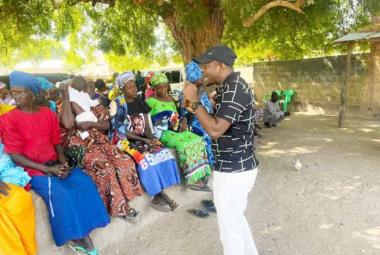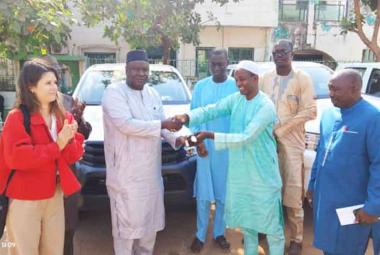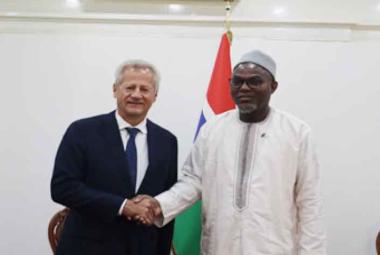By Fatoumata Joof & Abdou Mbye
The Ministry of Higher Education, Research, Science and Technology (MoHERST), in collaboration with the Ministry of Basic and Secondary Education (MoBSE), The Gambia College and the World Bank, recently convened an education session on the recently concluded Adaptive Learning Pilot (AL Pilot) in The Gambia. The aim of the session was to bring together key stakeholders to reflect on the challenges and collaboratively explore innovative solutions to enhance the quality of pre-service teacher education. The session discussed insights from the recently concluded AL Pilot, which utilised the Al-driven platform Mindspark to support pre-service teachers in developing fundamental math and English skills.
Speaking at the session, the Honourable Minister of Higher Education, Research, Science and Technology, Professor Pierre Gomez, noted that the session was also focused on reviewing the outcomes and key lessons from the Adaptive Learning Pilot and to discuss implementation challenges and potential solutions. He said this includes to explore opportunities for scaling up adaptive learning technologies and other interventions to improve the content knowledge of pre-service teachers, and align on potential next steps and future directions.
Highlighting the challenges, Prof Gomez said recent estimates suggest that approximately 90% of our 10-year-olds struggle to read and understand a simple passage. This statistics, he asserted, is not just a number; “it represents the future of our nation, our children, who deserve better,”. He highlighted that the recent Teacher Competency Assessments have revealed that only about 60% of our graduating pre-service teachers for lower basic education achieved minimum proficiency. “These stark realities demand immediate and undivided attention,” he emphasised.
In response to these challenges, Minister Gomez mentioned the launching of the Adaptive Learning Pilot, a collaborative effort among MoHERST and MoBSE, The Gambia College, and the World Bank, aimed to enhance the foundational math and English skills of their pre-service teachers using Mindspark, an AI-driven adaptive learning platform. The Senior Economist at Education Global Practice, the World Bank, Mr. Jason Weaver, recognised that the role of teachers, especially teachers in the early grades, is crucial in improving foundational learning.
He said the Government’s efforts to improve teacher competency through the Teacher Competency Assessment and transitioning to a three-year teacher training programme is essential step towards ensuring that every student has access to qualified, and competent educators. Mr. Weaver noted that the World Bank is proud to have supported the rollout of the TCA in The Gambia, as a vital tool for ensuring teacher quality. “We have since offered the TCA as a good practice model for other countries facing similar challenges with the quality of newly trained teachers. But we must do more and do it quickly to address the challenges revealed by the TCA results,” he affirmed. Aboubacarr Jallow, Principal of The Gambia College assured that the Gambia College, as the entity responsible for training of teachers, will continue to strive for the improvement of quality education of teachers.







